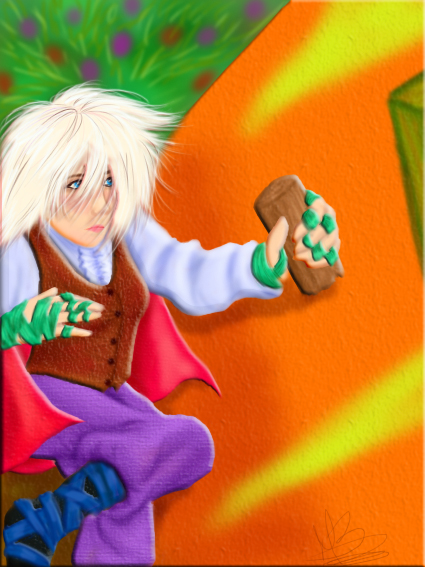



Favorite Things of 2009 (Part One)
Apologies to all my blog readers for nearly two months of absence. Life swamped me and completely overwhelmed me, restricting my internet a
ctivity to answering the most basic emails.
For my first post of the new year, I've decided to provide a litany of my favorite books,movies,music and television series of 2009. Bear in mind,the list only compiles the top four or five favorites and not every single favorite thing within each category. If I were to list every single book I've read and loved, it would definitely take up about two pages worth of posting.
Anyways, without further ado, here are my favorite things from 2009.
Favorite Book:
Brandon Sanderson's books: During a turbulent December, this book greatly unstressed me with it's rich world and interesting characters. I discovered Brandon Sanderson's books by chance when learning of the writer who had been asked to finish the uncompleted Wheel of Time series. Curiosity then persuaded me into buying the Mistborn series and later, "Warbreaker."
I've only read the first Mistborn book and Warbreaker and both have led me into becoming a psychotic Brandon Sanderson fan. Besides George R.R. Martin, his books were my antidote for my adult fantasy fiction drought. They also dissuaded me from holding the belief that the adult fantasy section was devoid of substance.
Ironically, his books gave me enough reason for me to attempt to read other adult fantasy books. As result, my former pile of young adult fantasy books was replaced with a pile of Robin Hobbs, Brent Weeks, and Anne Mccaffrey books. Each and everyone of these books are still on my hefty "to be read and reviewed," list.
But I highly recommend any of Brandon Sanderson's books, specifically Warbreaker. Normally, I'm not too fond of complicated magic systems but here I found myelf poring over the pages describing both "Allomancy," and "Biochroma." Brandon Sanderson's books awakened my sciencetific side and left me desirable for even more pages depicting this highly ingenious magic system.
One of the stand out elements of any of his books lies with his expertise with characters. Any story without complicated, dimensional characters are immediatley rejected as "nonreads." Warbreaker and Mistborn contain characters with conflicting ideals and ideologies. Both of which are not cemented and are still undergoing the process of forming into potential strong beliefs. This in effect reflects the true conflict of the human psyche that is unable to affix itself to one belief. Instead Sanderson's character's minds pick and choose their beliefs which are often altered by the experiences of life thrust upon them.
I shall end my speal about Brandon Sanderson's books here since my inner geek seems to want to endlessly herald, praise, and appreciate his masterful works. Simply stated, without the intrusion of geek jargon, Brandon Sanderson's books come highly reccomended for any reader who has found themselves becoming disallusioned with the fantasy market as a whole.
To Wheel of Time fans: I'm in the process of reading through the series right now and am very happy that your fandom has been honored with having such a skilled writer to conclude the series. After having the opporitunity to attend his signing and hearing his zeal towards writing a sucessive final book,I am convinced that the final books could potentially be better than the four or five books before Book Twelve.
Other Stand Outs:
Maria V. Snyder's Study series (see archived reviews)
Barry Lyga's Goth Girl Rising (see archived review as well)
Libba Bray's Gemma Doyle Series: Do not be disheartened by the covers because the books themselves have a wide appeal to any reader who likes fantasy books with strong, well developed female characters and a plot that's filled with gothic intrigue.
Catching Fire by Suzanne Collins (See archived review)
Favorite Movie:
Coraline
This movie earns my top spot without much of a struggle. 2009's movies were mostly dissapointing and void of intelligence. The first half of 2009 contained both "Watchmen," and "Coraline" which were both direct opposites of the number of unintelligent, special effect laden films of the second half of the year. Coraline specially entreated me and other viewers with a well imagined setting filled with colorful creatures and a devilish "other" mother. The movie itself provides an important message of being content with the things provided in our lives. Since sometimes the envied and highly idealed elements could bring upon a host of problems. Basically, nothing blissful comes without added challenges. To my blog readers, please watch Coraline not because it's a product of Neil Gaiman's genious but because it's a wonderful CGI film that contains mystique and not cheap thrills.
Watchmen
Superhero films are oftentimes moronic and usually are aimed at the "ID" audience that desire blood spill without the contemplation or the possible moral defacement. Watchmen stands opposed to those films by providing us with characters who all have fallacious moral compasses. The writer never forces his idealogy or philosophy on us and we must form our own opinions about whom might be the right or wrong character.
Many comic book fans were irate about this film because it did not compare to the comic book. Having read the comic book, I was well aware that no movie would ever dethrone the comic book because any excellent novel can never be reprodouced perfectly by another filmaker.
I had my doubts about Zach Snyder since I abhorred his last film "300" which was basically rampaging mess of violence that pleased the "ID" crowd. But Zach Snyder's visual centered films worked perfectly with Watchmen and greatly impressed me. Again, some fans disliked the film whereas I thought it was wonderful and expertly edited. The montage at the beginning of the film was reason enough for me to herald this film as being a great comic book adaptation.
Other Standouts:
Sherlock Holmes: The film hardly represents the famed Sherlock Holmes from Arthur Doyle's book series. Yet the film strangely entranced me mostly due to the wonderful performances of Robert Downey Jr. and Jude Law. When everyone praises Robert Downey Jr.'s acting ability, they are accurate since within both "Iron Man" and "Sherlock Holmes," he is brilliant.
Harry Potter and the Half Blood Prince: Another excellent adaption, thanks to David Yate's talent. Again, nothing will ever match the quality of the books themselves. But the acting ability of the cast really helps in at least granting the fans with a great adaptation more dependant on acting rather than expensive special effects.













